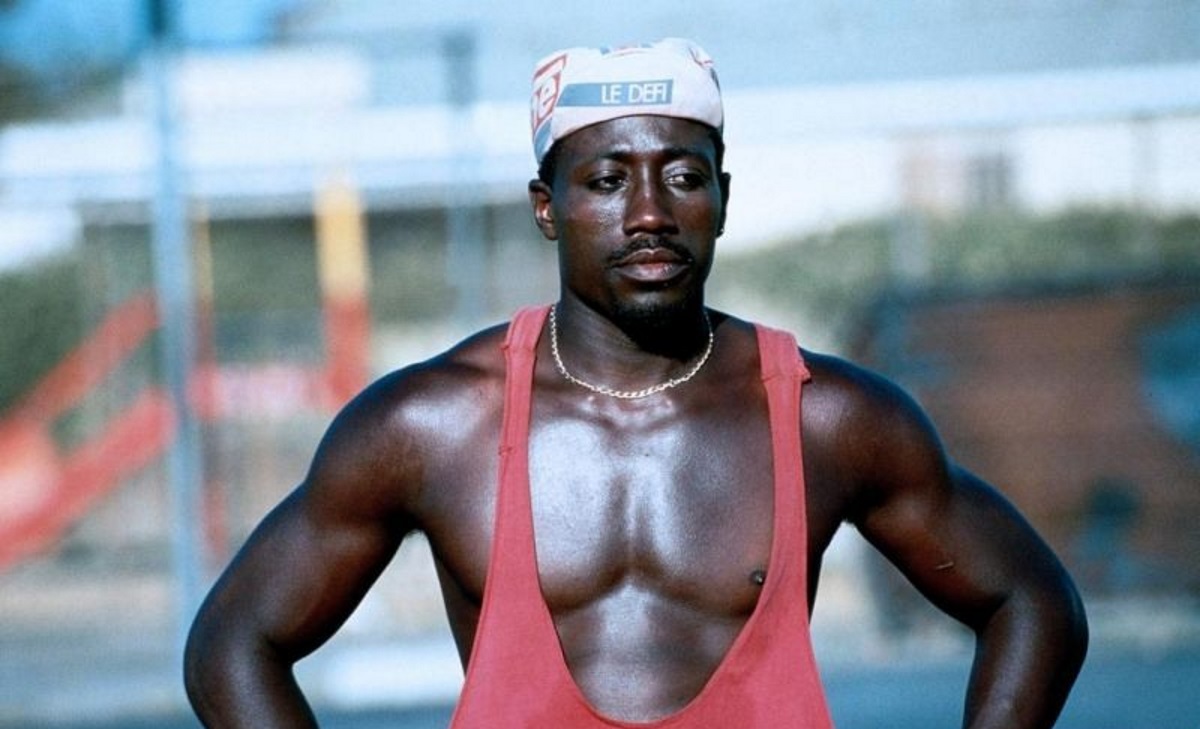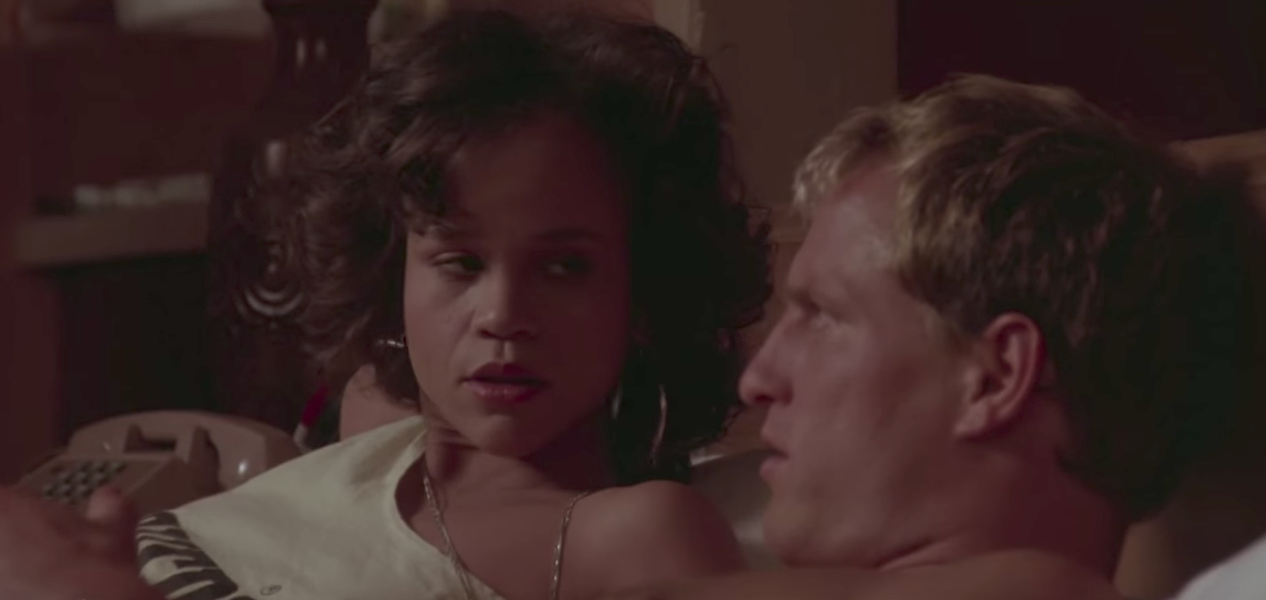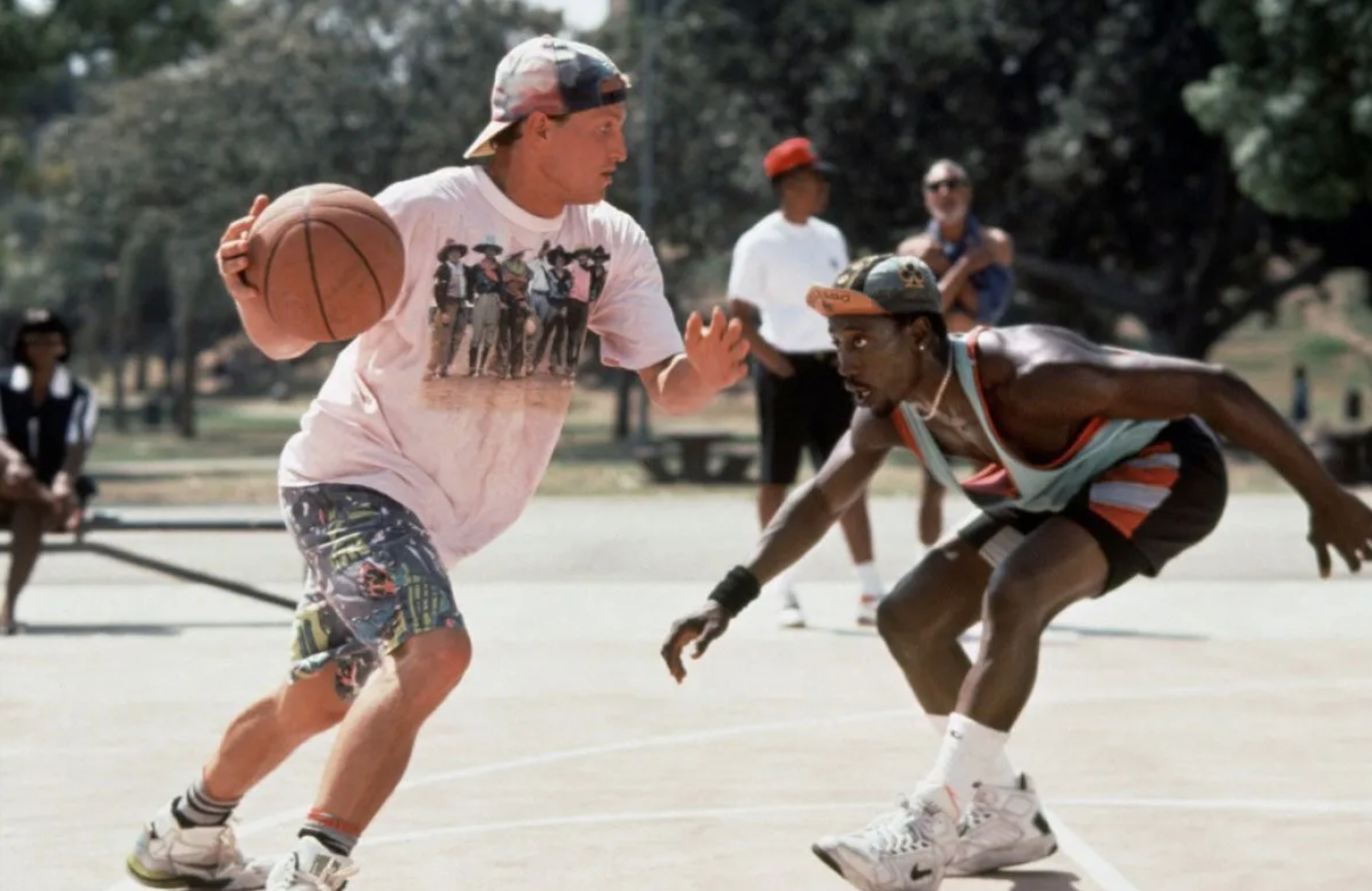Until I started writing this article, I had no idea Ron Shelton’s 1992 masterpiece White Men Can’t Jump had a budget of around $30 million. I mean that in the best way possible. It’s a film that came out a year before I was born, set in about a dozen nearly identical corners of Los Angeles and one Jeopardy! studio, with a decently earned hard-R and the goofy sensibilities of a feel-good PG-13. It has all the weird contradictions of a ‘90s indie film, and remains, years later, an odd and feverish assessment of sport, race, and romance in the grift of uniquely American vice.
I confess I haven’t seen Shelton’s earlier film, Bull Durham. I have no idea what Bull Durham contains. I have no desire to watch Bull Durham; the canon of baseball cinema feels too vast to conquer, and Field of Dreams exists, playing indefinitely on late-night TV to scratch that itch.
Basketball cinema, on the other hand, is a lot smaller and less great, often a vehicle for antiquated paternalistic impulses (The Way Back), for existing superstars (both versions of Space Jam), or the occasional Spike Lee joint (He Got Game). White Men Can’t Jump is a basketball movie, of sorts. But it’s less about basketball, and functions more as a vehicle for understanding what basketball means, and the aspirational impulses of sport itself.
White Men Can’t Jump is a film about mobility—the mobility of friendships, relationships, of racial animus, class mobility, and yeah, sometimes, the mobility of getting up on the rim for a dunk. When Wesley Snipes’ Syd Deane stands outside a house in a white picket fence neighborhood desperately trying to convince his wife out of wanting to rent it, talking about his endless hustles waiting to capitalize, you feel it.
None of the grifts at the heart of the film amount to much, especially given the work our characters put into them, and even through the backward lens of inflation. A few hundred bucks here and there. $1700 in one case. Not chump change, also no way to earn a sustainable living. But the way the film plays out the bravado, competition, and craft of street basketball, of setting up and executing a well-designed scam, really makes you understand.
It’s about earning things on your own terms, knowing you got one up on someone the way the world got one up on you and feeling good about doing it. The opening scene of White Men Can’t Jump is a 20-minute overture of dialogue, gamesmanship, and very clever people playing clever sleight-of-hand in order to prove their dominance, not at the game of basketball, but in a court domain that feels attainable, yet just barely out of reach.
All of this is, naturally, evergreen within the scope of life under capitalism, be it 1992 or 2022, and can be overcome by the power of friendship.
Bob McCabe of Empire Magazine’s Rotten Tomatoes blurb for White Men Can’t Jump is simple: He says, “Mostly, it rocks.” I imagine this is because “Mostly, dudes rock” was not in his era’s lexicon. The other part of White Men Can’t Jump which cannot be ignored is the propensity of its dudes to rock, often at the expense of everything else in their lives, including their relationships.
Woody Harrelson’s Billy Hoyle and Rosie Perez’s Gloria Clemente have a hideous relationship. It has warmth, but watching this film in our current moment begs the question, ‘Why is Gloria with this man? He is not a good man to be with. He is in fact, a very bad man with enough scant redeemability for me to be watching this without anger.’
Hoyle isn’t a piece of shit, but he tells her to shut up just a little too much and a little too angrily. She’s a savant who wins a game show for five-figures and still lets him in on a cut. The women in White Men Can’t Jump are all much smarter, more put together, and craftier than the men. They’re smart enough to leave them when it’s time. The men, to their credit, are smart enough to understand why.
But this isn’t a film about relationships. Relationships are articulated in such a way that we understand romance gets in the way of dudes rocking. The relationship between Deane and Hoyle is an incisive, all-time bromance, one that has no easy path. Their relationship is fraught with a kind of lateral exploitation, full of double-crosses and immense challenges to each other’s pride and masculinity. It zips with a verbal cadence that is pure pleasure. There’s not a lot of dense visual storytelling in White Men Can’t Jump; if you listened to it as an audio track, you’d enjoy the whole film and just miss out on the ‘90s neon fits.
There’s a racial aspect within the title, and to White Men Can’t Jump’s credit, the racial politics are handled delicately despite their bluntness. It’s a play on stereotypes, regional archetypes, and racial ones. The film stays entertaining and subversive, knowing where to cut, where to pass, and when to call timeout on itself without ever going for the lowest hanging fruit.
I’ve never heard a salient or thought-out criticism of the film’s articulation of racial difference and competition, and it doesn’t seem like there is one. It’s simple. It understands the conventional, unspoken racial categorization that exists to this day, and it uses that categorization to create a fertile battleground through which our heroes find common ground in the foxholes of class war.
A non-stop, occasionally repetitive, duel of egos, hitting the same chord over and over again until it finds a breakthrough. It understands the nature of friendship as being collegiate, and how collegial friendships are always tinged with professional envy and a scarcity mindset. It teaches us how these things are overcome when dudes rely on each other, despite not really liking each other for like, 90% of the time they spend together. A vital takeaway in the age of Amazon unionization.
There’s a valid criticism to be made of the film’s main characters being in a state of arrested development, but it’s a kind of stasis that believably exists on the margins of class, where true upward mobility is usually an unattainable pipe dream. White Men Can’t Jump often uses its female characters to articulate some kind of Protestant work ethic that feels too heightened to be believable–whether this is indicative of gender politics circa 1992’s Men Are from Mars, Women Are from Venus, or a simple counterpoint to the juvenility of its male leads, I do not know.
It feels like the one misstep in the film’s articulation of class mobility, and at the end of it all, Gloria leaves Billy, allowing him to rock all he wants with his new best friend. A tale of male friendship and an assessment of toxic masculinity that remains exceptionally earnest.
It’s that earnestness that keeps this film relevant. Other films that touch on similar subjects from the era, such as Spike Lee’s Jungle Fever (also starring Snipes) have been one-upped by more intricate and subtle examinations of difference and relationships. By making White Men Can’t Jump about the haggard, fraught nature of male friendship, Shelton’s work avoids a similar sense of aging. It’s as earnest as it’s ever been, and as it ever could be.
There’s a remake of White Men Can’t Jump in the works from Calmatic, Kenya Barris, and Doug Hall, starring Jack Harlow. All talented figures who will provide a necessary Black perspective on the original, a film directed and written (albeit, very well) by a white man. It feels right–Barris’ work on Black-ish and Harlow’s earnest braggadocio seem like a good fit for the material, and the only outstanding question is what a remake would do to elevate the original, where a new piece of IP might be a better fit to explore the themes.
White Men Can’t Jump has hardly aged a day, 30 years on. Its surface-level observations are pleasant and oddly deep. Its core relationships are just as wickedly pleasurable as ever. And yes, its dudes still rock.












